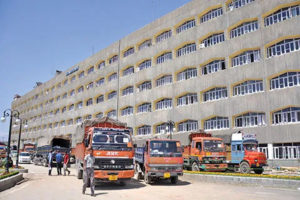
Context:
Durbar Move is a bi-annual shifting of the Civil Secretariat and other offices of the state government from Jammu to Srinagar in summer, and vice versa in winter.
The tradition
Durbar Move is a bi-annual shifting of the Civil Secretariat and other offices of the state government from Jammu to Srinagar in summer, and vice versa in winter. This is done as Jammu & Kashmir has two capitals: Kashmir during summer and Jammu during winter.
In Jammu, offices shut on the last Friday and Saturday of April and reopen in Srinagar on the first Monday after a gap of a week. In Kashmir, offices shut on the last Friday and Saturday of October, to reopen in Jammu on the first Monday after a week’s gap, in November.
The reasons why
- Durbar Move is a tradition started 149 years ago started by the erstwhile Dogra rulers who hailed from Jammu, but had expanded their boundaries to Kashmir including what is now Pakistan-occupied Kashmir, and Ladakh.
- Jammu, Kashmir and Ladakh are very different from one another geographically, linguistically and culturally, and in those days were poorly connected by road.
- It is generally understood that the Durbar Move was started to take the administration to the doorstep of the people of Kashmir which is closer to Ladakh.
- During summer, ruling from Kashmir also helped in ensuring adequate supplies to Ladakh, which is closer to Kashmir than Jammu, before the winter snowfall would cut off Ladakh.
- The practice also enabled greater interaction and bonding among the people of Jammu, Kashmir and Ladakh.
The effort
- Until 2019, the administration used to engage hundreds of trucks and buses for carrying office records and officials from one capital city to another.
- For safe transportation, the Jammu & Kashmir police and paramilitary forces would dominate the entire Jammu-Srinagar national highway.
- Apart from the expenses incurred on hiring trucks and buses, the moving staff also used to be paid TA and DA, besides arrangements for their accommodation.
The criticism
- Voices of protest started during the late 1980s, over the amount of money and time spent on the exercise.
- However, the practice also enjoyed public support. In the late 1980s, the then government of Chief Minister Dr Farooq Abdullah had decided to bifurcate the Secretariat by permanently keeping some departments in Kashmir and some in Jammu, but Jammu observed a bandh for nearly 45 days in protesting, leading to the government withdrawing its decision.
- In recent years, many criticised the government for spending nearly Rs 200 crore on this exercise every year when it did not have enough funds even to pay salary to its employees.
- Last year, the Jammu & Kashmir High Court observed that there was no legal justification or constitutional basis for the Darbar Move tradition.
- Pointing out that the practice has resulted in wastage of tremendous amount of time, efforts and energy on inefficient and unnecessary activity, a Division Bench comprising then Chief Justice Gita Mittal and Justice Rajnesh Oswal observed that valuable resources of the state (financial and physical) cannot be diverted to completely non-essential usage when the Union Territory in unable to provide even basic essentials to its people.
- The court recommended that in case the practice was rationalised, the resources and time saved could be utilised towards the welfare and development of the UT; the money saved could also be used to address Covid-related issues like food shortage, unemployment and healthcare.
What now
The UT government has decided to switch to e-governance, will all office records converted into digital format. As a result, while the Secretariat employees and some offices will move from Jammu to Srinagar as usual this year, only sensitive records will be shifted from one place to another.

